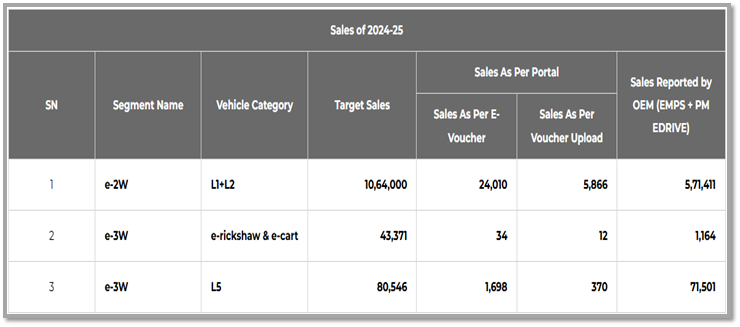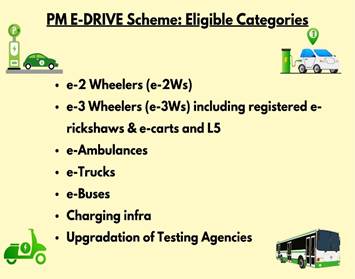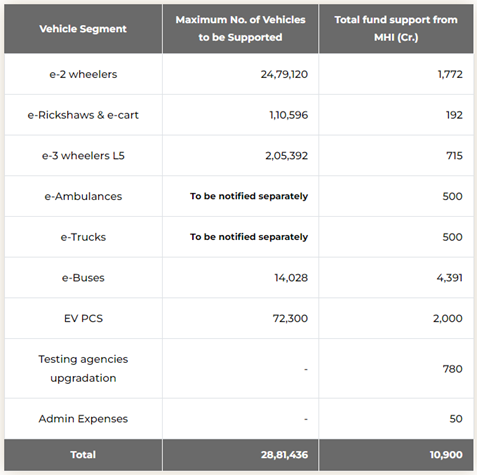Others
PM E-DRIVE Scheme: Electric Vehicle Sales Soar
Posted On:
05 NOV 2024 6:20PM
The ‘PM Electric Drive Revolution in Innovative Vehicle Enhancement (PM E-DRIVE)’ Scheme, recently approved by the Cabinet with a financial outlay of Rs. 10,900 crore, came into effect on October 1, 2024, and will remain in force until March 31, 2026. The primary goal of the scheme is to accelerate the adoption of electric vehicles (EVs), develop essential charging infrastructure, and establish a robust EV manufacturing ecosystem across the country. Under this scheme, electric vehicle sales have already seen a record surge, reflecting the growing momentum of EV adoption.
The PM E-DRIVE initiative promotes mass mobility by supporting public transportation systems. The key objective is to speed up the transition to electric vehicles by offering upfront incentives for EV purchases and encouraging the development of charging infrastructure. The scheme seeks to reduce transportation-related environmental impacts and improve air quality while promoting an efficient and competitive EV manufacturing sector in line with the Aatmanirbhar Bharat initiative. This will be accomplished through a phased manufacturing program (PMP) to boost domestic manufacturing and strengthen the EV supply chain.
The PM E-DRIVE scheme is implemented through the following key components:

- Subsidies: Demand incentives for electric vehicles such as e-2 wheelers (e-2W), e-3 wheelers (e-3W), e-ambulances, e-trucks, and other emerging categories of EVs.
- Grants for creating capital assets: Funding will be provided for the acquisition of electric buses (e-buses), the establishment of a comprehensive network of charging stations, and the upgrading of the Ministry of Heavy Industries (MHI) testing facilities.
- Administration of the Scheme including IEC (Information, Education & Communication) activities and fee for project management agency (PMA).
Surge in Sale of e-vehicles
The Ministry of Heavy Industries is leading the nationwide push for electric vehicle adoption, contributing to India's ambitious net-zero target for 2070. Through initiatives like the Electric Mobility Promotion Scheme (EMPS) and the PM E-DRIVE schemes, electric two-wheelers (e-2W) sales have surged to 5,71,411 units in 2024-25. During the same period, sales of electric three-wheelers (e-3W), including e-rickshaws and e-carts, reached 1,164 units, while electric three-wheelers in the L5 category hit 71, 501 units.

PM E-DRIVE Scheme: Eligible Categories
- Two Wheelers: The scheme aims to incentivize approximately 24.79 lakh electric two-wheelers (e-2Ws). Only e-2Ws equipped with advanced batteries are eligible for this incentive. Both commercially registered and privately owned e-2Ws can benefit from the scheme.

- Three-wheeler: The initiative is designed to incentivize around 3.2 lakh electric three-wheelers (e-3Ws), covering registered e-rickshaws/e-carts or L5 category vehicles. Only those e-3Ws with advanced battery technology are qualified for the demand incentive. The scheme is solely applicable to e-3Ws used for commercial purposes.
- e-Ambulance: A budget of Rs. 500 crore has been allocated for deploying e-ambulances under this scheme. This is a new government initiative to encourage the use of e-ambulances for comfortable patient transport. Performance and safety standards to be established in collaboration with the Ministry of Health and Family Welfare (MoHFW), Ministry of Road Transport and Highways (MoRTH), and other relevant stakeholders. Eligibility criteria for e-ambulances are currently under discussion with MoHFW and will be announced soon.
- e-Trucks: The scheme aims to promote the adoption of electric trucks to reduce CO2 emissions and establish e-trucks as a key logistics solution in the future. A fund of Rs. 500 crore has been set aside to incentivize the use of e-trucks. Only those holding a scrapping certificate from MoRTH-approved vehicle scrapping centers (RVSF) are eligible for the incentives. Monitoring systems will verify scrapping certificates. The relevant details for e-trucks including number of vehicles to be supported, maximum subsidy, performance criteria, etc. will be notified separately based on consultation with relevant stakeholders.
- e-Buses: A total of Rs. 4,391 crore is allocated for the procurement of 14,028 electric buses by State Transport Undertakings (STUs)/public transport agencies. The demand aggregation for these buses will be managed by CESL in nine major cities, with more than 40 lakh population namely Delhi, Mumbai, Kolkata, Chennai, Ahmedabad, Surat, Bangalore, Pune and Hyderabad. Preference to be given to cities procuring e-buses after scrapping old STU buses as per MoRTH guidelines. For procurement and operation of e-buses in unique geographies – hilly and north-eastern states, island territories, coastal regions, etc. different set of guidelines including non-OPEX model as suitable to support e-bus penetration may be adopted by MHI.
- Charging infra: The scheme aims to establish a robust network of public charging stations, including 22,100 fast chargers for e-4Ws, 1,800 for e-buses, and 48,400 for e-2Ws and e-3Ws, boosting user confidence. These charging points to be installed in key cities with high electric vehicle penetration and along select highways. The total outlay for charging infrastructure under the scheme is Rs. 2,000 crore.
- Testing agencies upgradation: The scheme aims to upgrade and modernize testing agencies under the Ministry of Heavy Industries (MHI) to equip them with new and emerging technologies, thereby promoting green mobility. The upgradation of testing agencies with an outlay of Rs.780 crore under the aegis of MHI has been approved.
Boosting Demand for Electric Vehicles Through Incentives
The scheme emphasizes demand incentives as a core component, directly aimed at increasing the adoption of electric vehicles (EVs). With a focus on affordable and eco-friendly public transport, it primarily targets electric two-wheelers (e-2Ws) and three-wheelers (e-3Ws) registered for commercial use. Privately or corporately owned e-2Ws are also eligible. To promote the adoption of advanced technologies, only EVs equipped with advanced batteries get benefitted from these incentives. However, EVs purchased by government departments are not qualified for demand incentives, preventing the transfer of funds within government bodies.

All EVs must be registered under the Central Motor Vehicles Rules (CMVR), 1989, to qualify for these incentives. Vehicles which comply with PM E-DRIVE eligibility criteria are considered under this scheme. All e-2Ws and e-3Ws must be manufactured and registered within the scheme’s validity period. No PM E-DRIVE certificate for e-2W/ e-3W will be valid after the scheme expires. The demand incentive is proposed at Rs. 5,000 per kWh for e-2Ws/e-3Ws registered in FY 2024-25 and Rs. 2,500 per kWh for FY 2025-26. Incentives will be capped per vehicle or at 15% of the ex-factory price, whichever is lower. Furthermore, only EVs with ex-factory price less than a particular threshold value, as outlined in the PM E-DRIVE Scheme, will qualify.
The Demand Incentive shall be available for buyers (end users/consumers) in the form of an upfront reduced purchase price to enable wider adoption, which will be reimbursed to OEM (Original Equipment Manufacturer) by MHI. For individual beneficiaries, not more than one EV of a particular category will be incentivised. All models eligible for demand incentives shall be accompanied by a comprehensive warranty (including that of battery) from the OEM, who should have adequate facilities for after-sales service for the life of vehicle.
Additionally, the scheme aims to expand charging infrastructure within cities and on selected inter-city/highway routes in coordination with the Ministry of Road Transport and Highways (MoRTH). The quantum of financial support, benchmark prices, number of guns & other technical parameters for setting up of charging infrastructure, including its upstream cost, shall be determined in consultation with MoP. Flexibility of funding for establishment of charging infrastructure, to the extent of 100% of cost (including upstream power infrastructure) of the project, may be made available for promoting electric mobility.
The Ministry of Heavy Industries (MHI) is introducing e-Vouchers for EV customers to avail the demand incentive under the scheme. The scheme portal will generate an e-KYC Aadhaar FACE authenticated e-Voucher for the customer at the time of purchase. A link to download the e-Voucher shall be sent on the registered mobile number of the customer. This e-voucher will be signed by the buyer and submitted to the dealer to avail demand incentives under the scheme. Thereafter, the e-Voucher will also be signed by the dealer and uploaded on the PM E-DRIVE portal. The signed e-voucher shall be sent to the buyer and dealer through an SMS. The signed e-voucher will be essential for OEM to claim reimbursement of demand incentives under the scheme.
Conclusion
In conclusion, this initiative by the Government of India is set to address critical challenges related to environmental pollution and fuel security while advancing sustainable transportation solutions. Through the promotion of electric vehicles (EVs) and supporting infrastructure, the scheme is expected to catalyze significant investment in the EV sector and its supply chain. Furthermore, it will generate substantial employment opportunities across the value chain, including jobs in manufacturing and charging infrastructure setup. Overall, this scheme represents a crucial step toward a cleaner, more sustainable future for transportation in India.
References
https://pmedrive.heavyindustries.gov.in/about-us
https://pmedrive.heavyindustries.gov.in/policy_procedure
https://pmedrive.heavyindustries.gov.in/docs/press_release/Press%20Release_Press%20Information%20Bureau.pdf
https://pmedrive.heavyindustries.gov.in/dashboard-home
Click here to download PDF
******
Santosh Kumar/ Sheetal Angral/ Aswathy Nair
(Explainer ID: 153390)
आगंतुक पटल : 1750
Provide suggestions / comments